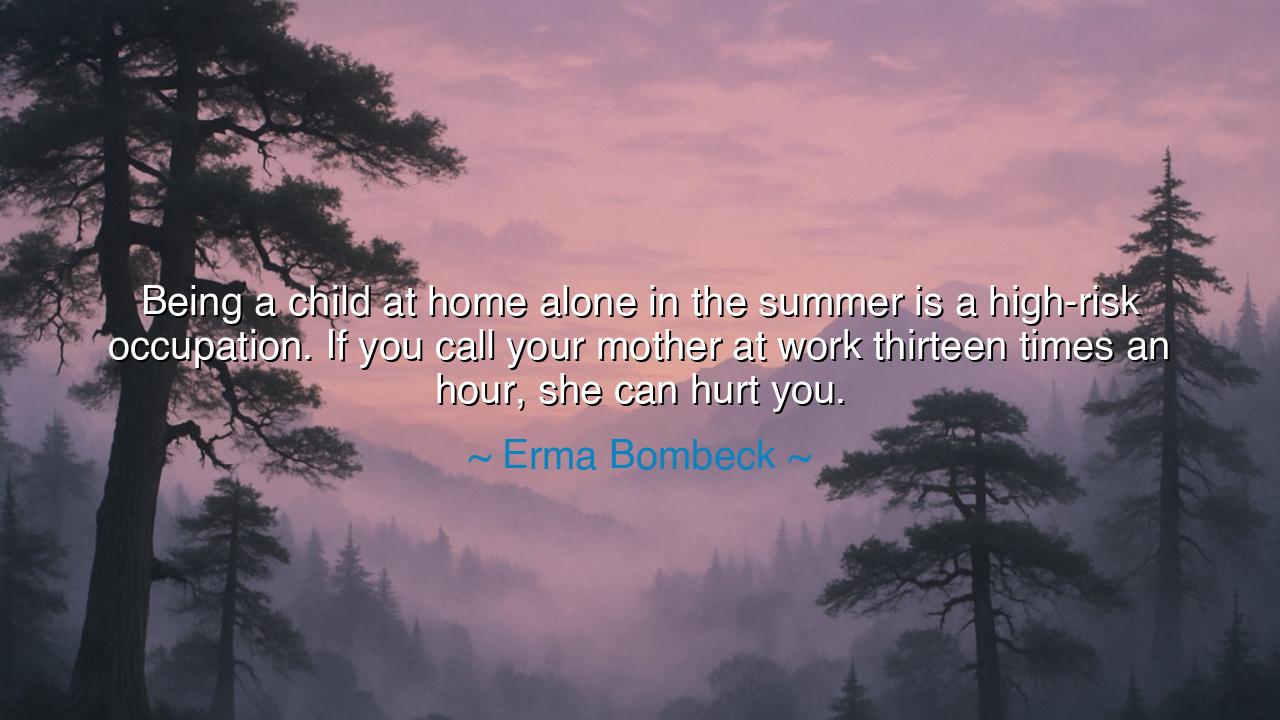
Being a child at home alone in the summer is a high-risk
Being a child at home alone in the summer is a high-risk occupation. If you call your mother at work thirteen times an hour, she can hurt you.






“Being a child at home alone in the summer is a high-risk occupation. If you call your mother at work thirteen times an hour, she can hurt you.” — thus wrote Erma Bombeck, the great humorist of the American home, whose words glowed with laughter but carried the quiet wisdom of everyday life. Though her tone was playful, beneath her jest lies a truth profound and universal: that love, patience, and exhaustion often live together under one roof. Bombeck’s humor was the mirror of ordinary heroism — the daily struggles of mothers, fathers, and children, whose small dramas make up the great story of human life.
In her line, Bombeck speaks of childhood mischief and maternal endurance, but also of the delicate balance that binds a family. To be a child “alone in the summer” is to live in that shimmering space between freedom and chaos — where curiosity reigns, but wisdom is absent. To call a mother “thirteen times an hour” is not only a comic exaggeration; it is the cry of a young heart that seeks connection, even in its independence. And the mother, who toils away in a world that demands both tenderness and strength, feels the pull of both love and frustration. Thus, Bombeck’s wit touches the eternal tension between care and fatigue, between affection and discipline.
Her humor was born of truth. Erma Bombeck lived as a writer, a wife, and a mother, chronicling the world of domestic life with a wit that never mocked but always illuminated. In this quote, she reveals a reality every parent has known — that the labor of love is sometimes laughter through clenched teeth. The mother who answers the endless phone calls, who works while worrying, who longs for peace yet misses the noise — she is the quiet hero of the home. Bombeck’s humor softens the ache of this truth, but does not deny it. She reminds us that love is not the absence of irritation; it is the persistence of care despite it.
History, too, offers us examples of this sacred strain of love. Abigail Adams, wife of the second U.S. president, managed her home and children for years while her husband labored in distant halls of power. Her letters reveal both tenderness and exasperation — nights spent alone, children demanding endless attention, a nation still in birth. Yet never did she cease to love, nor to laugh at her burdens. Like Bombeck’s imagined mother, she too might have smiled through her fatigue, knowing that the chaos of family is the forge of affection.
There is, in Bombeck’s jest, a subtle heroism. It is not the grandeur of conquest, but the valor of endurance — the strength to love amid noise and repetition. The mother, tested by the phone that rings too often, must find in herself the patience of the divine. And the child, though foolish and unaware, is also learning — learning what love is, not from lectures, but from the unbroken bond that survives the thirteenth call. Thus, through humor, Bombeck teaches the sacred art of forgiveness — that love, to endure, must laugh at its own trials.
In her hands, the ordinary becomes eternal. The telephone, the summer day, the weary sigh — these are transformed into symbols of human connection. Bombeck’s wisdom whispers: the comedy of family is also its glory. It is the dance of imperfection, the song of two hearts colliding in care. To love one another in such daily chaos is to touch the divine in human form — for even the gods must have smiled once upon hearing the prayers of tired mothers and restless children.
Lesson: Cherish the humor in hardship. When life grows noisy and demands press from all sides, remember that laughter is the breath of patience. Parents, learn to see in your children’s clamor the echo of love itself. Children, learn to see in your parents’ weariness the cost of that love. Do not let irritation steal tenderness, nor exhaustion silence joy. For one day, you will remember the sound of that thirteenth phone call not as trouble, but as proof that you were loved enough to matter.
Thus Erma Bombeck, with her laughter as her lamp, teaches us that the world of the home — messy, loud, imperfect — is not merely where life happens. It is where love learns to endure, where humor redeems fatigue, and where even irritation, properly seen, becomes the smile of the soul.






AAdministratorAdministrator
Welcome, honored guests. Please leave a comment, we will respond soon